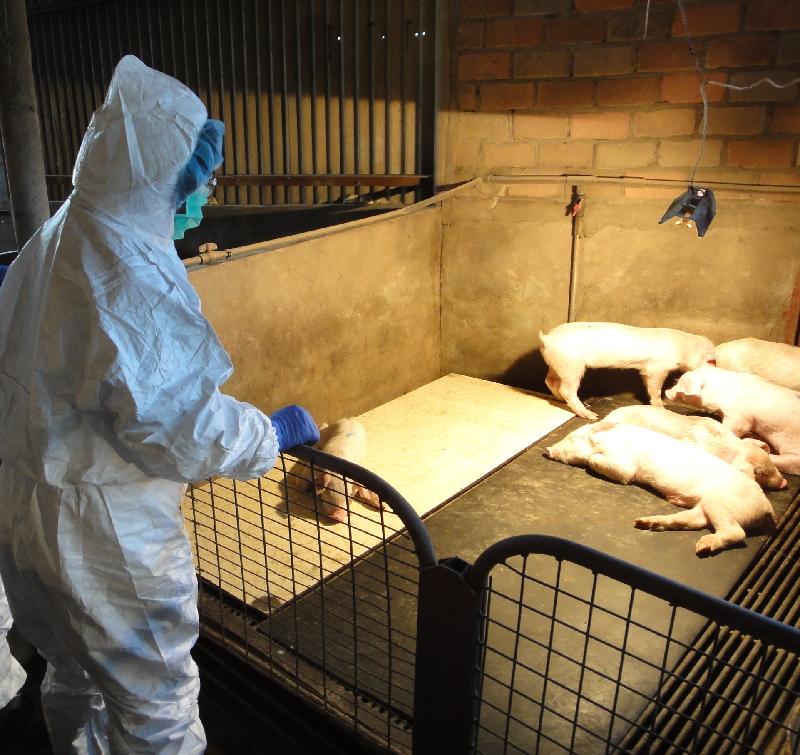Government heightens vigilance and enhances measures to prepare for African Swine Fever (with photos)
In the light of the latest development of the African Swine Fever (ASF) outbreak, the Secretary for Food and Health, Professor Sophia Chan, today (December 20) convened an interdepartmental meeting again to listen to reports of the Food and Environmental Hygiene Department (FEHD) and the Agriculture, Fisheries and Conservation Department (AFCD) on the latest situation, and review the preparatory work and contingency strategies in place that guard against the spreading of ASF to Hong Kong, with a view to ensuring swift and effective response in different scenarios.
"ASF is a contagious disease in pigs which will not be transmitted to human, posing no food safety risk. Well-cooked pork and pork products are safe for consumption. Since the first ASF case on the Mainland in August this year, we have already implemented a number of preventive measures. So far, there has been no ASF case in Hong Kong and in Mainland registered farms for supplying live pigs to Hong Kong. Nevertheless, we do not take the issue lightly, and have already stepped up the biosecurity work in various areas, including local pig farms, slaughterhouses and boundary checkpoints. We will take further measures having regard to the latest development," Professor Chan said.
"Regarding the concern of the public and the trade about live pig supply, the recent supply of live pigs from the Mainland has remained rather steady, both in terms of quantity and auction price, with no extraordinary fluctuation. We have all along been keeping close liaison with the relevant Mainland authorities to maintain steady supply of live pigs, and ensure that all live pigs come from qualified registered pig farms for supplying Hong Kong that are not affected by ASF.
"Although ASF does not involve any food safety issue, due to the need to prevent this disease from infecting local pig farms, pigs being tested to be ASF-borne or coming from ASF-infected registered farms will be culled and not released to the market. We appeal to the public not to buy pork with unknown sources. Pork has to be thoroughly cooked before consumption." she said.
As ASF could cause massive infection and death in pigs within a short period of time, to prevent ASF from infecting Hong Kong and severely impacting the local pig rearing sector, FEHD and AFCD have put in place a suite of measures to enhance the preventive work in different areas, such as cleansing and disinfection of vehicles and personnel entering and leaving the slaughterhouses and pig farms. FEHD staff will inspect the health certificates of all live pig consignments from the Mainland and monitor the health status of live pigs at the boundary checkpoints. All imported and local pigs have to undergo ante-mortem and post-mortem inspections in slaughterhouses before supplying to the market. If suspected symptoms are detected in pigs, samples will be taken and immediately sent to AFCD's laboratory for rapid tests. Furthermore, FEHD and the relevant government departments will strengthen co-operation to crack down illegal importation of fresh meat.
AFCD will continue to raise local pig farmers' knowledge of preventing ASF through various channels, such as organising meetings and seminars with the trade. At present, all local pig farms have already suspended the importation of breeders from the Mainland. AFCD has amended the licence conditions for livestock keeping to ban the use of swill of animal origin as pig feed effective from January 12, 2019 to minimise the risk of contracting ASF. AFCD inspects all local pig farms frequently to ensure that the preventive measures are properly implemented.
Moreover, the Food and Health Bureau, FEHD and AFCD met with representatives from the trade several times in the past few months to inform them of the development of the outbreak and actions being taken by the Government, and take heed of their views. The Government will continue to maintain close communication with the trade.


